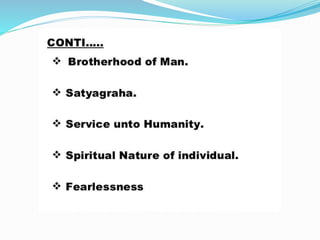Knowledge and curriculum unit 3
- 1. UNIT 3 CHILD CENTERED EDUCATION
- 2. UNIT 3 CHILD CENTERED EDUCATION Meaning and characteristics of Child centered education – Educational thoughts of Mahatma Gandhi, Rabindranath Tagore, John Dewey, Plato, Paulo Freire with special reference to the three concepts: activity, discovery and dialogue relating to child centered education.
- 3. Child Centered Education -Meaning
- 7. EDUCATIONAL THOUGHTS OF • MAHATMA GANDHI • RABINDRANTH TAGORE • JOHN DEWEY • PLATO • PAULO FREIRE
- 12. A)Immediate Aims B) Ultimate Aims a) Vocational Aim a) Spiritual Development b) Cultural Aim c) Character Aim d)Perfect Development Aim e) Dignity of Lab our f) Training for Leadership g) Individual and Social Aims
- 13. CURRICULUM
- 14. • Education through craft • Medium of Instruction : Mother Tongue • Emphasis on Activity Method: Learning by doing Lecture Method Questioning / Discussion Method
- 17. His Philosophy As a Vedantist : •He had a firm belief in the philosophy of veda •He believed in “I am Brahama” •There is a spiritual bond between man and man As an Individualist : • He believed in giving right type of freedom to individual • Every individual is unique
- 18. As an idealist : • he believed that the man should live for the ultimate truth which liberates us from cycle of birth and death • had faith in absolute values As a Spiritualist : • He believed that every individual should try to attain spiritual perfection As a Humanist : • He preached human brotherhood,having faith in fundamental unity of mankind
- 19. He remarked that “ Even God depends upon man for perfecting his Universe” As an Naturalist : • He considered nature as a great teacher • God revealed himself through various forms, colors and rhythm of nature. Tagore’s Internationalism: • He was an ardent prophet of world unity • He believed in world brotherhood
- 33. PLATO ( 424/423 – 348/347 BC)
- 34. • Every individual should devote his life to what is best fitted for him to do • The important function of education is to determine what every individual is by nature capable and fitted of doing things • Poor leadership will lead to wrong decision • Social justice is giving what is due to whom it is due
- 35. • The physical objects are not permanent representations of unchanging ideas alone give true knowledge as they are known by mind • Intellectual aristocracy is the rule of intellectual elite • An individual who should be endowed with superior intelligence and possessed impeccable integrity
- 36. He distinguished between the reality presented to us by our senses sight, touch, taste, sound and smell and the essence or form of that reality. In other words, reality is always changing – knowledge of reality is individual, it is particular, it is knowledge only to the individual knower , it is not universal.
- 37. Knowledge obtained from senses i.e. Knowledge of objects,colours,taste,touch etc., But Plato does not consider this as real knowledge. An opinion regarding any object, but this knowledge cannot be relied upon as the views of person differs regarding the same object. Knowledge through mind or wisdom It is the highest degree of knowledge which includes virtues like truth, goodness and beauty. This knowledge is idealistic and is based on original thinking. The characteristic of knowledge is that it is found in the form of universal truth.
- 38. Children enter school at sox where they first learn the three Rs(Reading, Writing and Counting) and then engage with music and sports
- 39. Plato recommended play method at elementary level; student should learn by doing. And when he/she reaches the higher level of education, his reason would be trained in the processes of thinking and abstracting. Plato wanted motivation and interest in learning. He was against the use of force in education. “ Knowledge which is acquired under compulsion obtains no hold on the mind” According to Plato “Do not then train youths by force and harshness, but direct them to it by what amuses their minds so that you may be better able to discover with accuracy the peculiar bent of the genius of each”
- 40. • The educator is considered to have greatest importance • He is like torch bearer who leads a man lying in the dark cave, out of the darkness into the bright light of the outside world. • The teacher is thus the constant guide of the students • The teacher must be a person of high integrity and must possess high self worth. • He must have pleasing personality, in depth knowledge and professional training. • He should be deeply committed to his profession, have high sense of responsibility and a true role model. Teachers should lead a true moral life. They should practice what they preach.
- 41. PAULO FREIRE (1921 –1997 )
- 49. Conclusion Children are active participants in their own education and development. This means that they should be mentally involved and physically active in learning what they need to know and do. Child centered has been an important foundation of early childhood education.
















































